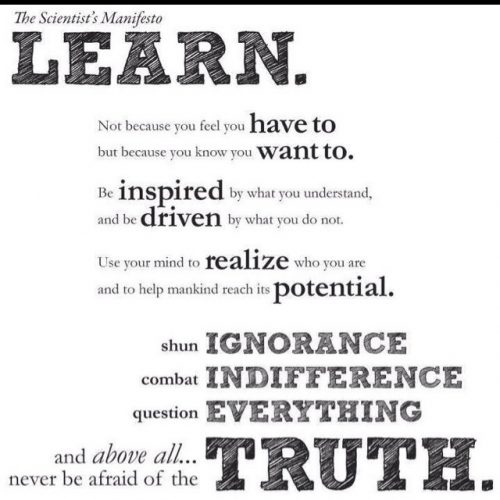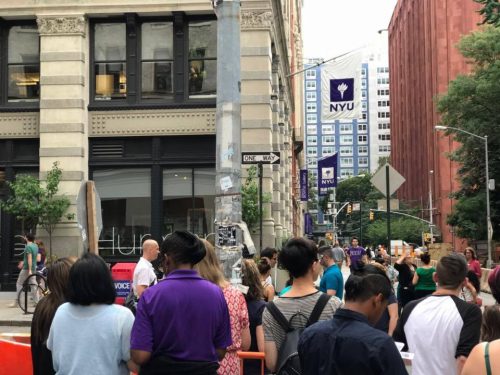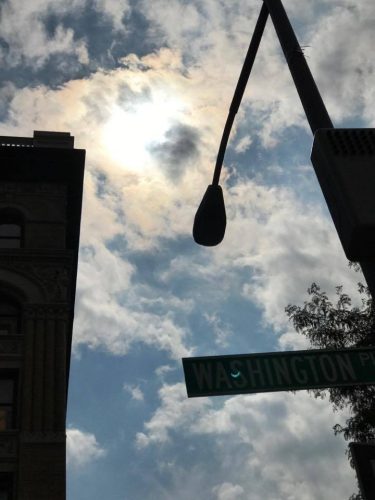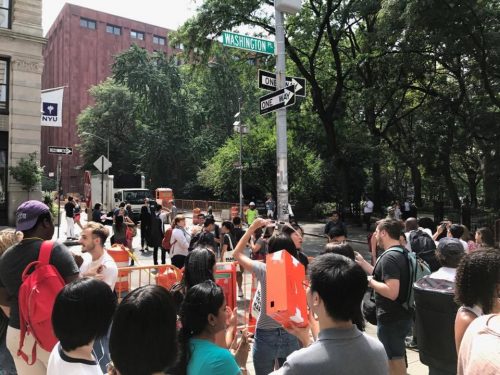Picture this: at 2:34, some 8 floors above Manhattan, 15 people, giddy with childish excitement, crowd together in a wooden walled elevator, showing off various masking-tape/cardboard creations and seemingly opaque goggles. You would not perhaps immediately connect these overgrown children with their immensely serious and intelligent alter egos as the scientists of the New York Biomedical Chemistry Institute. This spectacle can of course mean only one thing. A full eclipse. (Well, 70%ish.) Today, for a short time in decades, New York saw a rare cosmic treat.
Out in the dimming light, on the corner of the lab building and Washington Square Park stood the most unlikely selection of people carrying the most obtuse equipment. Students, professors, researchers, passers by, tourists and builders carrying paper plates, cardboard boxes, paper glasses, lab goggles hastily coated in XRay film, and cameras to name a few. Together they all, in some form or another, directed their attention upward. Up beyond the trees of the park, beyond the great buildings of the city and beyond the clouds toward the highly anticipated spectacle. The eclipse reached its zenith at about 2:44, but the black silhouette of our normally nocturnal lunar companion was visible, slowly gliding across her daytime counterpart for a good half hour either side.
But, taking a break from your cardboard box or questionably rigged goggles, resting your neck for a while and looking around the crowds yielded a sight almost as amazing, and certainly warmer, than the celestial mechanics brought to light above us. All sorts of people laughing together, perfect strangers sharing their viewing glasses with one another, gasps, smiles and comparisons of ragtag telescopes. Our professor reflected, “For the happiness and sense of community these paper glasses gave, they were the best $2 ever spent!” She was quite right, and amongst the exclamations and communal awe, a voice rang out with my favorite observation of the day, “Science is dope, man”.
Science is indeed dope.
Science is itself a great equalizer. Today a scientific event brought together people of all genders, nationalities, beliefs, jobs and ages into great crowds, sharing in the most immense of all emotions, that of pure awe. I should perhaps say however, that there was only one true age of people in the crowd. Children. The children were children, and the adults were also children. This is because when we watch events like these, we are overcome with the curiosity and awe that were present in us all when we were once children discovering the world for the first time.
As Sir David Attenborough says, children are natural born scientists. We all are born with a natural curiosity, driving us to explore, and so to learn. No organism worth its salt would survive without this key driver. Carl Sagan also agreed, and he went one step further. He talked of how society beats this curiosity out of children. Through education, indoctrination, or whatever causes it, children turn to adults and leave their enthusiasm and curiosity for science behind with their old toys. Only a few children cling onto their natural love of exploration, and these few are the people who become the lab coat draped scientists of your imagination (and indeed the giddy children in the elevator at 2:34 today).
However, science is not just about lab coats, horrific equations, bad smells, annoying experiments and people telling you your favorite things are unhealthy. It is not just a day job, it is itself a way of life. Every one of us can be a scientist, without ever stepping in a lab; we can all be driven by that infantile curiosity that we all once possessed. And I could not put it better myself than a well known post that floated through social media to me a long time ago:
Figure 1: A Scientist’s Manifesto

This credo has wormed its way to being my ultimate set of guiding principles. They guide sensible thinking, permanent growth, and truly drive humans to be the best that they can be.
Anyone who follows this Scientist’s Manifesto can, not only call themselves a scientist, but a better person.
Science is dope. It is a way of life. It is humanities saving feature. And I beg you to be a part of it by embracing its principles.
Figure 2: Pictures of the eclipse
Some of the varied crowd
Don’t look at the sun…
(you can see the eclipse reflection by the ‘S’ on the street sign)

How many make shift telescopes can you see?

Embrace your inner nerd!!!
